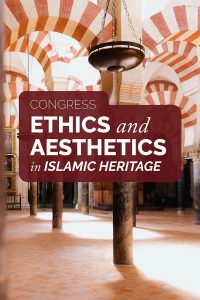 The University Platform for Research on Islam (Pluriel) will hold its fifth international congress in Córdoba, Spain, on the theme « Ethics and Aesthetics in Islamic Heritage » from February 10 to 14, 2026. A call for papers is open until April 15, 2025.
The University Platform for Research on Islam (Pluriel) will hold its fifth international congress in Córdoba, Spain, on the theme « Ethics and Aesthetics in Islamic Heritage » from February 10 to 14, 2026. A call for papers is open until April 15, 2025.
RIIFS Director, Dr Renee Hattar has joined the Coordination Comittee of Pluriel in 2024.
More info on PLURIEL website.
Argument
Ethics (aḫlaq) and aesthetics (ǧamāliyya) play a central role in Islamic thought and heritage. On the one hand, in the Islamic tradition, ethics is engaged in the pursuit of virtue and harmony with divine principles. On the other hand, Islamic aesthetics explores expressions of beauty in art, architecture, and poetry, often connected to a spiritual and symbolic quest. The works of al-Ġazālī often serve as a reference point, frequently examined through the synthesis of moral and spiritual virtues deployed in his writings (Moosa). Similarly, the ethics of Ibn Miskawayh, particularly in his Tahḏīb al-aḫlāq, influenced by Greco-Arabic philosophy, has been the subject of numerous studies and commentaries (Arkoun). In this vein, Muḥammad ʿAbduh’s Risālat al-tawḥīd presents an innovative reflection on ethics by linking the rational and spiritual principles of Islamic monotheism to the quest for a harmonious society founded on justice and individual freedom. Works such as Oleg Grabar’s studies on Islamic art, Navid Kermani’s exploration of the aesthetic experience of the Quran, and Christiane Grubber’s analysis of the rhetoric of images in Islam demonstrate the richness of this field.
While both concepts are significant in Islam, they are generally studied separately. For instance, ethics has been analyzed from the perspective of moral philosophy or mysticism, while aesthetics has been the focus of research on art or artistic practices. Very few studies have sought to understand their articulation, their interweaving, their tensions, and the implications of this relationship for Islamic heritage. This lacuna is what this Congress intends to fill. By seeking to investigate the deep and sometimes ambivalent links between ethics and aesthetics in Islamic contexts (Arab, Persian, Turkish, Chinese, etc.), the Congress will adopt an interdisciplinary, comparative, and dialogical approach encompassing both intra-Islamic and interreligious perspectives. It will also consider how these relationships illuminate contemporary issues related to identity, representations, and cultural dialogue.
The originality of this Congress lies in its ambition to explore the connections between ethics and aesthetics in Islam: how do these two dimensions intertwine in practices, representations, and discourses? How are they in tension? What are the conceptual and methodological challenges researchers face in contemplating their articulation?
Drawing on historical, cultural, and artistic examples, this Congress aims to explore questions such as the interconnection between ethics and aesthetics in Islamic heritage, the application of aesthetic values in daily life, the instrumentalization of art for purposes of power or religious exclusivism, the integration of art as a space for encountering the Other, theological reflections for an ethics concerned with a heritage hospitable to alterity, and the reconciliation of creative freedom with ethical responsibility.





